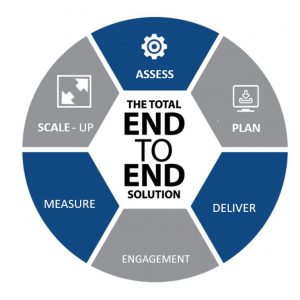Discover CinQ, Esports for Digital Leadership
TRANSFORMING A ‘TEAM OF
EXPERTS’ INTO AN ‘EXPERT TEAM’
The primary purpose of scenario training is to train people and
teams in the necessary skills for the future growth of the business
without risk and with a high ROI
Scenario Training
Purpose
The primary purpose of scenario training is to train people/teams to develop, realise, assess, and maintain performance in the development of skills and competencies necessary for the future growth of the business without risk and with a high ROI.
Scenario Training… ”is a bridge between classroom learning and real-life experience”.
Scenario Training System
In its simplest form, a scenario learning system usually includes :
A display, or multiple displays, to represent visually the external environment.
Control devices, such as a game controller, to provide control inputs to the simulation.
A communication system to allow participants to collaborate and work together
A computer system or systems to host and process the simulation scenario
Multiple platforms: desktop, mobile, tablet
Software: the simulation scenario / mission environment in virtual 3D world
Transforming a ‘Team of Experts’ into an ‘Expert Team’
Most critical errors occur in business at the point where highly skilled people come together to perform as a team. Effective decision making, team collaboration and team communication can be the fundamental factor that determines the successful outcome of the project or the client initiative. Until now, little training provision has existed to rehearse team decision making and collaboration. Scenario training addresses this business need with an approach that no other training methodology can. Critical and time pressured situations can be recreated in a training scenario, so that processes, routines and procedures can be established and communication and collaboration problems can be identified and improved upon.
New Technological Innovations
Stay ahead of the learning technology curve :
- Virtual reality headsets,
- wearables,
- games consoles,
- mobile platforms
7 Benefits of Scenario Training
Train any time, anywhere, anyplace
Scenario training systems can be accessed 7 x 24 at different locations
Train in less time… for less expense
The intensity of scenario training systems compresses time such that 1 training day is worth weeks on the job experience
Practice – Practice until it is second nature
Teams and individuals can start, stop, repeat, and replay the scenario as many times as necessary
Permits participants to make and learn from mistakes without risk
Sessions can be recorded, replayed and reviewed, allowing performance evaluation and feedback
Prepare to deal with all types of situations and circumstances
Gain a depth of experience and knowledge you cannot get any other way. Simply stated, Scenario training, while confronting challenging situations and obstacles, gives you that advantage
Prepare to respond to challenges before you meet them
It is always the unpredictable that challenges most participants during critical decision making. As the scenario simulation difficulty increases, practicing the setting of priorities and experiencing how you choose to exercise your judgement as a leader or part of a team will reveal strengths and areas where additional focus is required
Scenarios can be designed to meet specific learning objectives
Training scenarios can capture or represent a range of business problems more readily for the learner than otherwise having to wait for a real encounter. Such simulations will give learners exposure and practical experience of difficult decision making situations and ensure a level of preparedness for the real world
Human Resources Re-invented

Over the past 20 years the military, aviation and healthcare communities have made a large investment in understanding how training scenarios can be used to accelerate the impact of learning
With tremendous development of technologies the opportunities for talent, learning and development teams to create, develop and deliver training scenarios to meet the demands of the business is unprecedented.
Simulation training serves as “a bridge between classroom learning and real-life clinical experience.” No longer must students practice giving injections by using an orange or budding surgeons practice suturing by using a piece of felt.
Quite simply, integrating training scenarios into the organisation could re-invent the role of Human Resources as a consultant to the business, as a value added partner.
Scenario Story
Scenario Story Objective
We wanted participants to discover and learn about two highly influential and important business management theories, disruptive innovation and doubleloop learning*. We wanted participants to see that organisational innovation and business success depend on your teams ability to communicate, collaborate and solve complex problems. We wanted participants to simply see that decision making is a skill, and that it can be trained.
* google is your friend.

Good management was the most powerful reason 'leading firms' failed to stay atop their industries.
Scenario Story Framework
We took the key principles of business innovation and business communication and integrated them into the hero’s journey structure. We borrowed from the story of the Matrix (the film).
- The Circle Inc. (the machines)
- Black Swan (the rebels)
- Good Management Culture (the matrix: the invisible force in which humans are unknowingly ensnared)
Use Scenario Stories to powerfully engage, motivate and develop innovation, creativity, problem solving, leadership and teamwork skills.
Scenario Story Plot
What is the story of CinQ ? It is about a battle for power between two corporations.
On one hand you have The Circle Inc. which controls everyone through the power of good management.
And on the other hand, you have Black Swan, a secret resistance force fighting to reveal the truth about the power of The Circle.
AND ONLY ONE CAN WIN !
Disruptive Learning Coaching
Business as a Contact Sport
We see business as a contact sport. There are winners and losers. And that is a tough message for many people. But it is a fact. We see disruptive learning as an important training support to make HRD relevant in the fight to helping both you and the business to win.
Work with Disruptive Learning Solutions coaches to see how CinQ can be used to meet your business needs and take you to your next level of innovation
The 4 HRD Challenges and Disruptive Learning
The four fundamental issues facing HRD are
- culture and engagement,
- leadership capability
- learning and development and
- re inventing HRD (see Deloitte link).
These are serious gaps in the HRD business model, but they are also pointing out a great opportunity for HRD to step up to the plate and deliver some ground shaking changes that revitalise and transform the principles of training. With this challenge in mind we coined the term Disruptive Learning to describe our key design principle. That is we upset the traditional business-training pedagogical principles underlying HRD programmes by focusing on creating “positive error” rather than error as “measure of failure”
Forward Error Pedagogy
That is making errors and making mistakes is a positive state and moves the learner forward, rather than backwards, in the learning process. In fact “forward error”, learning and unlearning, creates new skills which are immediately available to the business upon finishing the training programmes. That is when you or the team fail to communicate or collaborate effectively, you have to go back again and again until you develop the competence high enough to work for you and the team.
Transferable Skills
Then these skills created during the scenario are transferable to the business. That is when you fail, when the team fails you have to re-evaluate why and how and have to go again and again till you succeed. In many training sessions we have had multiple participants fail to solve key problems. They had to work at and sweat it. Eventually solving this scenario allowed the teams to work across a wide range of competencies, display advanced communication and collaboration skills and also dig into their reserves and find the grit and character to continue and persevere at achieving the scenario. Paradoxically hard resulted in fun and a real sense of accomplishment: this is disruptive learning.
Co-creating: Developing The Process To Add Value
From the very first contact we focus on understanding your key priorities and challenges and turning this understanding into a series of key metrics that add value to the business. We agree the goals, partnership process, planning and preparation, execution and assessment phase and review and follow up evaluation.

Scaling-up

Achieving scale
Disruptive learning looks great. Okay, but how do I achieve scale? We answered this objective when developing and installing a « train the trainer » programme we created with PRO BTP which certifies the trainers in the coaching principles of disruptive learning and educational technologies.
Certified Disruptive learner Trainers
Train the trainer allows trainers certified in Disruptive Learning Solutions specific scenarios to roll out quickly specific skills across an organization. We bring together holistically the three parts (people, process, and technology) of an organization by using educational technologies and specifically designed content to produce key results with people.
“Creating common understanding about problems creates both broader awareness of the need to develop scalable solutions and engagement”
Content is the key
By creating content specifically designed for a business need, like the two key areas we have under design now, crisis simulations and key account selling, we are able to create multiplayer and role playing complex problem solving training scenarios which participants learn to master without worrying about risk.
Learn and unlearn
Here participants can learn and unlearn and master new valuable skills which have an immediate business relevance. Training scenarios can also be released through on-demand multi platform technological solutions so that scenarios can be use 24/7 across the globe.
